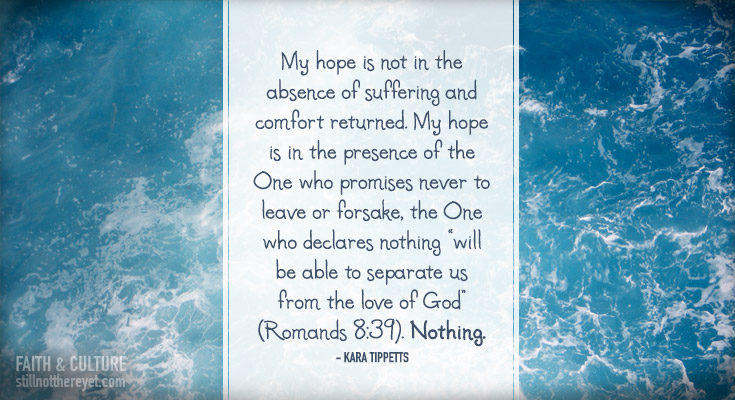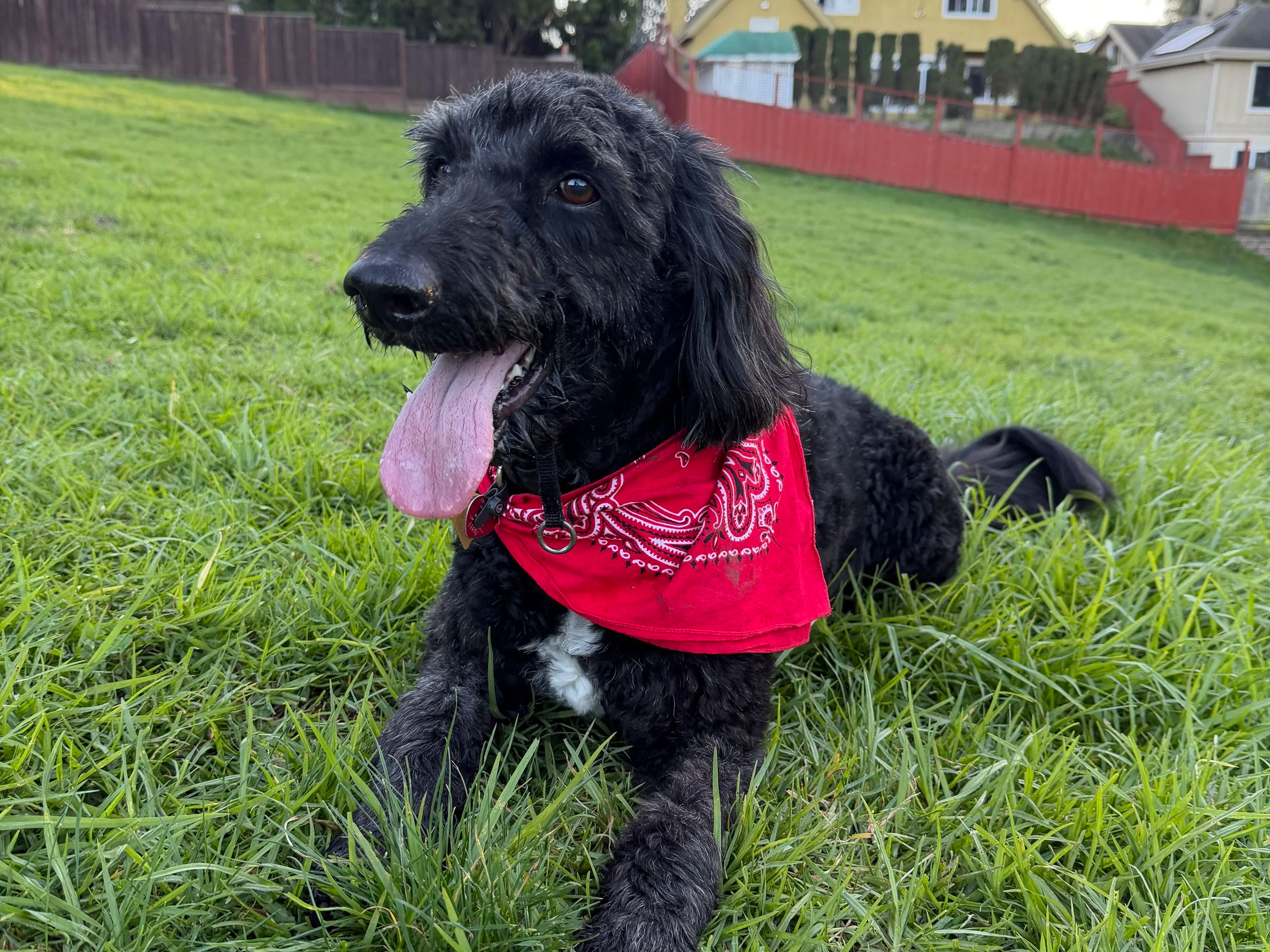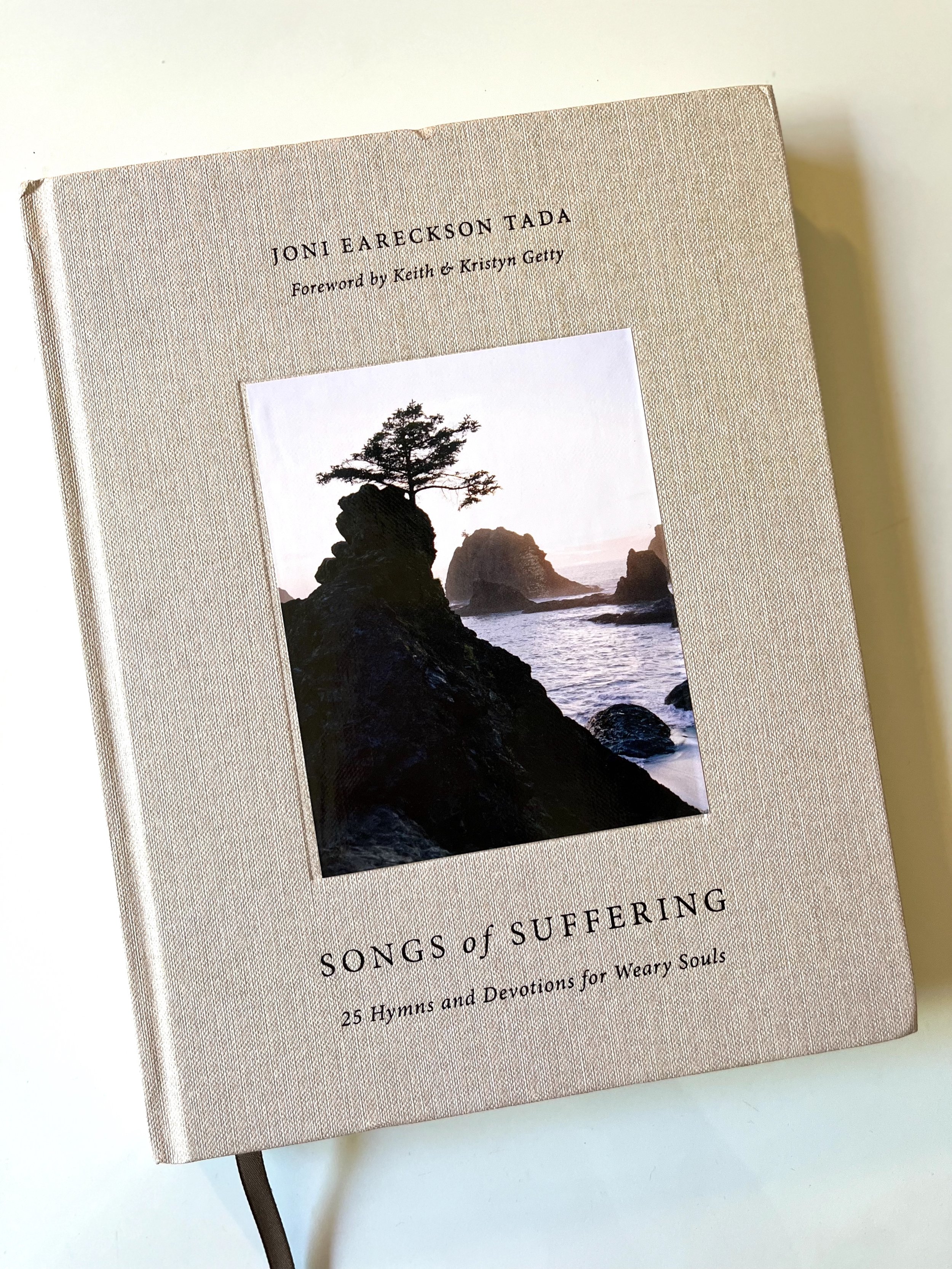5 Lies We Believe About Suffering
The muscle under my incision has been screaming with pain for the past two weeks. The surgeon had warned me that the muscles would take the longest to heal, but this is a new pain. I'm not sure what I've done, but I want it to stop. Pain like this, persistent and inescapable, does strange things to me. I don't think I'm alone.
When I'm in this kind of pain, I start thinking about things in distorted ways. I question truths I've believed for decades. I misinterpret kindnesses from others. I miss beauty surrounding me because my eyes are focused inward. On me. And my pain.
It's made me think hard thoughts about pain, suffering, and God...again. I've been wrestling with HOW to live in the tension of enduring suffering while also fully embracing the love and compassion of God. I think that's a good thing. Wrestling is honest work and there's hope in it. If there was no good God, there would be no wrestle, only despair. But there is a loving and compassionate God. We don't have to understand him completely in order to be comforted by his presence. To ask him big questions and reveal our fears and pain to him. He's big enough for that. And that's where we find hope in the wrestle.
As I've wrestled, I have identified 5 lies about suffering that I have bought into at one time or another. They are sticky little lies. Let's bring them into the light.
5 LIES WE BELIEVE ABOUT SUFFERING
1.Suffering is a punishment. It is so tempting to try to draw a straight line between a poor choice and a punishment. It can comforting to be able to draw that line because then we can identify the reason for our pain and never, ever do that again. But it isn't always that simple, is it? We can't draw that line for the friend suffering from cancer. We can't draw that line for the young child killed in a car accident. We can't and we shouldn't!The beautiful story of Job asks the poignant question, "Who are we to know the mind of God?" We cannot always unpack the reasons for our suffering but the Bible is crystal clear that not all suffering is punishment earned by the sufferer. The horrific pain Jesus endured on the cross was pain suffered by a sinless man. There is no clearer example that we cannot always draw that line from choice to suffering.Let's not try. I know, that's a hard thing to let go. But isn't it more honest to wrestle with the HOW to suffer well than to try to identify the WHY? There's beauty in the wrestle. It's hard. It's work. But it's productive. It brings us to the deep questions. It brings to light our rough edges so they can be sanded smooth through perseverance. It makes our souls richer and gives us lenses to see others in their suffering. If we let it, suffering can become a path, not a punishment.
2. Suffering is caused by loving too much. This one is a bit trickier. My friend, Josh Smith, has been helping me muddle through this lie. He explains it well, so I'll let you hear it in his own words.
"When Jesus came to Mary and Martha He saw them in anguish over the death of their brother. Jesus knew that in only a few minutes He would raise Lazarus. So why not greet them with a twinkle in His eye knowing that He was about to make everything all right. Because *raising Lazarus wouldn't make everything all right*. Lazarus would die again. So would Mary and Martha. It wasn't a fix to the problem at all. They, and many others that He loves, would feel emptiness, loss and anger at someone being taken from them and then would be told by those around them that "Life is suffering. It’s caused by holding onto things too tightly. If we just let go, then we could find peace.” The problem with that is that "the holding on" is love itself. In essence, we're being told that we live in a world where love causes suffering, when it’s really sin that causes suffering - not a particular individual’s sin, but the sin that has broken the world.
What if love isn't the problem? What if we are right to hold on tight to those we love? What if the impermanence of the current world is an unnatural state? What if we were meant to live and love for eternity? "
We suffer when we love others who are suffering. We suffer when we lose someone we love. But it isn't the love that causes the suffering. Let's not go down that road and close our hearts to the beauty of loving well. Loving BIG. Let's love without abandon and wrestle with the suffering that follows. It is unavoidable but that is no reason to wall up our hearts and "protect" them by loving loosely, or not loving at all.
3. We should strive to escape suffering.
I've fallen for this lie so many times. Every time my back pain spikes or my child rages from anxiety, I wish it would all go away. I think wrongly, "If this would just stop, I could handle things better. Things would BE better." But would they, really? They would be different, sure. But better? By whose definition?
The ultimate escape from suffering is to choose death. The lovely Kara Tippetts bravely revealed the lie when she wrote an open letter to Brittany Maynard, the young woman who ended her life in 2014 because she didn't want to suffer the effects of a brain tumor. Kara, who suffered and died from cancer less than 6 months later, wrote,
"Brittany, your life matters, your story matters, and your suffering matters. ...Dear heart, we simply disagree. Suffering is not the absence of goodness, it is not the absence of beauty, but perhaps it can be the place where true beauty can be known. In your choosing your own death, you are robbing those that love you with the such tenderness, the opportunity of meeting you in your last moments and extending you love in your last breaths."
I just love Kara's compassionate heart. She embraced all the aspects of her suffering and choose to believe there is beauty in every facet.
What's really behind this lie? I think it might be envy. A desire to have it better because someone we know has it "better." Maybe they have a strong body. Maybe they have compliant children. Maybe they have a peaceful marriage. But wanting what they have (or don't have, in the case of pain and suffering) just makes me discontent with what our good God has given me. It leaves me feeling empty. I'd rather take the whole package, comfort and pain, and look for the beauty in the details. To be thankful for the little gifts of grace that I will find, if I look for them.
4. We are alone in our suffering. Oh, my. We have all felt this lie. And to some extent, it is true. Kelly Kapic, in his new book Embodied Hope explains,
"Limits are part of the everyday life of those with chronic pain [or chronic anything!]. Sufferers may have to choose between a friend's engagement party and grocery shopping because they don't have the stamina to do both. This doesn't make them antisocial. It doesn't mean they are unloving. Their physical suffering places stringent limits on them every day. Limits that isolate and exhaust." (My comments are between the brackets.)
But, isolation and true aloneness are not the same. There is so much comfort to be found in the presence of our loving Father. When I am feeling my most alone, I don't pray for strength or for relief. I pray to feel the presence of God with me because he has promised that. Some days, I just need to feel it.On the other hand, and maybe more importantly, Kapic points out that, sadly, we likely have all caused a suffering friend to feel alone.
"When people mistake theodicies [attempts to make a logical explanation for the apparent tension of human misery with the presence of an all-powerful, good God] for pastoral care, the voice of the sufferer is often silenced."
Telling a friend that God works all things for good in the midst of their unimaginable pain may be true, but is not usually helpful at that moment. What IS helpful is a listening friend. One who will enter into the struggle of emotions roiling in their heart. One who will read (or text) them a psalm. "The psalms, which are full of struggle, do not point us to answers. Hope? Yes. Answers? No. The pslams orient us to God.
"Let's not let our dear friends fall into the pit of aloneness. Let's be listening friends. Friends who love through words of affirmation and words of hope. Let's be Psalm-Friends. Friends who aren't afraid to step into the mess of unanswered questions. Friends who pray for and with our friends in the midst of their struggle. Friends who orient sufferers to the safe and compassionate heart of God.
5. Suffering incapacitates us or disqualifies us from ministry. Maybe this isn't a lie. Maybe it's an excuse. But it's one I want to push on a little bit.
When I first experienced chronic pain, I was in my 20's. I realized very quickly that on the days when I just laid in bed doing nothing, I became depressed. So, I chose to fight that. I chose to stay in leadership in BSF even though there were a few times I just couldn't get in the car and go. I realized that I could still minister to a small group of women even in my pain. That worked for me back then. I know it won't work for everyone, even for me in my current health crisis.
This time, I had no choice but to stop leading in BSF. So I prayed. I asked God to give me a new ministry, one I could do from bed or the couch. And he did. I was able to pray for and with my friends as they came to serve me and my family. I wrote my thoughts out and shared them with my community via Caring Bridge. I sat for hours with my mom (more time than we've spent together since before I moved out to go to college!) and just listened to her. She shared mundane things, shared her concerns about dad, shared her plans for the future. I was able to minister to her by being with her while she ministered to me by being with me.
My favorite role model of a person ministering to others in the midst of her own personal suffering is Darlene Deibler Rose. You can read her story in Evidence Not Seen. She was a missionary during WWII and taken captive in a Japanese Prison Camp. She lost her husband, her ministry, and every thing she owned. Yet, she chose to serve whomever she was with. She led Bible studies in her tent. She prayed with the Japanese commander of the camp, a man whom she struggled not to hate. She never, ever stopped serving Jesus. Even to the point of praying for others while in solitary confinement. She did not consider her circumstances to render her unable to minister. She only considered them to be different than she had planned.
Paul had his thorn. Jesus had his cup. We have cancer, Lyme, or depression. But God can use us all, no matter our circumstances.
The Sunday School song says, "This little light of mine, I'm gonna let it shine." Let your light shine in whatever dark place you are in. And when you think you can't, ask for help. In his strength, we can do more than we imagine.
This was a long post, but one that I hope brought encouragement. Asking the hard questions and going to the hard places takes bravery. But the reward is hope. God is still big enough; he still cares enough; and he is still with us. There is hope in that!




